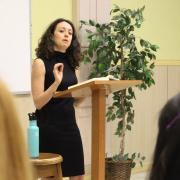My Time Among the Whites is a collection of witty, insightful essays by Jennine Capó Crucet on the strangeness of being an outsider in one’s own country. Crucet writes from a place of deep love for the country she calls home, and an acknowledgment of its ability to deeply hurt marginalized people and communities. Within this, Crucet explores the transference of privilege, colorism, and the importance of context in informing her experiences as a Latina woman.

Prairie Lights’ modest upstairs was packed with people of all ages eager to hear from the author herself about her book, and her experiences. A police detail lingered at the edges of the throng of Iowa City’s white, liberal elite. Crucet was recently met with outright hostility and violence (violence is of course, beyond physical bodily harm) after her forum at Georgia Southern University, culminating in a book burning of her work.

Despite the knowledge of this incident on the minds of most people at her reading and the broader awareness of our current political climate, Crucet invited the audience to laugh and engage in her work. There was a lightness that Crucet brought to her discussion of topics that are anything but, in a way that was restorative yet candid about the importance of the discussion of racism in America. The two essays Crucet read excerpts from were frank and autobiographical, encompassing issues of xenophobia, whiteness, the politics of names, and the importance of context. Touching on events from her life, Crucet illuminated the subtle ways oppression is enacted and the nuanced way people experience it. The discussion of these ideas through curated audience questions and the presenter’s thoughtful commentary made the space a safe one for questions and answers, but more importantly a type of civil discussion that is largely absent from our current society.
Crucet spoke of her experiences as a professor at the University of Nebraska, whose demographic is similar to Iowa’s, and navigating a certain kind of whiteness that was different from the ‘whiteness’ she had access to in her home state of Florida. Crucet spoke of being acclimated to seeing Cuban people as authority figures and in positions of power and having access to the whiteness that provided her. From this, Crucet detailed the idea that whiteness is not as much of a race as it is a mode of power and a dominant culture over other groups. This led into a discussion of how contemporary whiteness in America is further illuminated by an understanding of the social construction of race and whiteness.

The discussion ended with two revelations, one chilling and one restorative. She acknowledged the book burning at Georgia Southern as something that was not an isolated event and expressed that to her it was the fact that her book happened to be the first to be burned, but wouldn’t be the last, that was unsettling about it. Lastly, the importance of our personal feelings in discussions about race and power came with the responsibility to do something substantial toward change with our feelings.




